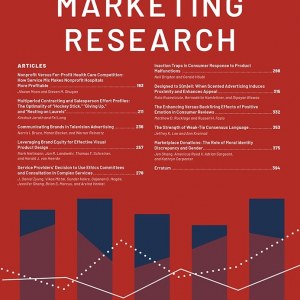
Dellaert, B., Donkers, B. and \van Soest\, A. (2012). Complexity Effects in Choice Experiment-Based Models Journal of Marketing Research, 49(3):424--434.
-
Affiliated authorsBenedict Dellaert, Bas Donkers
-
Publication year2012
-
JournalJournal of Marketing Research
Many firms rely on choice experiment-based models to evaluate future marketing actions under various market conditions. This research investigates choice complexity (i.e., number of alternatives, number of attributes, and utility similarity between the most attractive alternatives) and individual differences in decision time as key factors that affect the predictive performance of models based on choice experiments, both within and between complexity conditions. The results show that complexity and individual decision time not only affect the error in consumer choice models but also consumers' decision strategy and systematic utilities. The authors introduce a complexity-adjusted mixed logit (CAM logit) model to capture the various influences of complexity in choice experiment-based models. They illustrate the consequences of complexity on choice behavior with market share predictions of the CAM logit model for different complexity conditions.